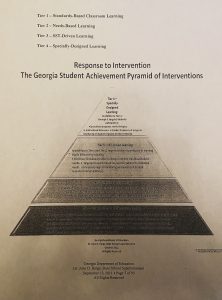Competency 8: Intervene with Individuals, Families, Groups, Organizations, and Communities
Intervene with Individuals, Families, Groups, Organizations, and Communities

As a social worker, I understand the vast importance that interventions play in the role of helping people. It has been my duty as a professional to apply my knowledge and skills along with evidence-based and ethical practices when developing intervention strategies. I understand that intervening with individuals and systems is an ongoing process which will take dedication, communication, and inter-professional collaboration. In my internship, I have practiced intervention strategies such as utilizing Response to Intervention practices along with cognitive behavior therapy and other interventions. It has been my goal to use my skills to be competent so that I am ethical in my endeavors towards helping clients. I commit to giving my best efforts and searching for the most useful and personal ways to integrate social work research and practices to help intervene with clients.
PRACTICE BEHAVIORS:
8A: Implement clinical evidence-based interventions with individuals, families, and/or groups.
Academic Evidence: For the final project in my Clinical II course, I structured and implemented a social anxiety group therapy session which walked high school students through the process of identifying and modifying negative thoughts (cognitive level: synthesis). In the pseudo video recording, I explained the basic concepts of Cognitive Behavioral Therapy: a widely known, evidence-based practice used to treat various mental health issues, including social anxiety. I further demonstrated the process of identifying negative thoughts–including cognitive distortions–and using CBT methods to modify those thoughts into something more realistic and positive. Throughout this process, I utilized my knowledge about evidence-based practices and combined them with the person-in-environment theoretical perspective so that I could effectively communicate the content to the students who are experiencing social anxiety.
Field Evidence: At my practicum setting, I sat down with the elementary school counselor to meet with a fifth grader who was struggling with severe anxiety associated with eating food in the cafeteria. After discussing the situation with the student’s parents, we were able to better-understand the reasoning behind this student’s fears. I utilized the evidence-based practice of Cognitive Behavioral Therapy as I talked with the student and helped explain to her how situations and thoughts worked together to create certain feelings. In this process, I implemented the evidence-based practice and used my skills of empathy, clarification, and reflection to communicate with this student about her situation. Here is a link to the journal entry where I reflect on this experience:Journal Feb 2.
8B: Integrate macro level evidence-based strategies with organizations and/or communities.
Academic Evidence: During the Advanced Administrative course, I utilized my skills of research analysis to understand, review, and plan the integration of evidence-based strategies to address the issue of depression and anxiety in youth (affective level: organizing), One macro level, evidence-based tool which several professionals are implementing in agencies is adventure or outdoor therapies. These encompass a variety of therapeutic practices which have been researched and found effective in treating anxiety and depression in several cases. In my course, I aimed to organize a plan which would integrate these strategies into an agency who sees youth who are struggling with anxiety and depression. Integration of these practices highlights the social work value of service and competence by effectively planning to intervene for young people dealing with mental health issues. Here is a link to the final assignment: Final Assignment Angel, Christensen, Wood-2.
Field Evidence: In February, I attended a Walker County School Success meeting where I represented my practicum placement of Chickamauga City Schools. At this meeting, several mental health, nonprofit, and school professionals came together to analyze the needs of students within the Walker County school system. One of the major topics which we discussed is the prevalence of substance abuse amongst children and teenagers. One professional present who had experience and practice with substance abuse-related issues brought up the various research revealing the negative effects of vaping: a common tobacco-use practice which has seen a drastic uprising amongst teenagers. Furthermore, this person had access to evidence-based resources including materials which school systems could use to spread awareness and relevant information about the topic of vaping. I spoke to this person, along with my supervisor, the Student Resource Officer, and the Gordon Lee High School Principal about receiving and distributing these helpful materials to the middle and high schoolers (affective level: receiving). I was able to gather pamphlets, posters, and educational materials for the school to utilize in order to intervene on the problem of prevalent vaping in youth. Here is an image of one of the pamphlets which I was handed at this meeting:Drugs and the Law Pamphlet
Other Evidence: The state of Georgia implemented the Response to Intervention program, which includes a variety of evidence-based strategies for education systems to integrate into their frameworks. At Chickamauga Elementary School, I paired with the school counselor to practice social behavioral strategies with four kindergarten students who are a part of the Response to Intervention plan. In this meeting, I applied exercises which helped these children to understand appropriate ways to interact with peers. Furthermore, I talked to them about classroom behaviors, and what actions are helpful for them to take in specific class scenarios. Below is a section of the RTI informative pamphlet, primarily focusing on the RTI pyramid, which my supervisor provided me with during my practicum.
